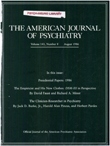Do we need a new word to supplement "hallucination"?
Abstract
The word "hallucination" was used originally (and with etymological correctness) to refer to the unshared sensory experiences of persons who are mentally ill. However, many persons who are not mentally ill also have unshared sensory experiences. A few of these convey information paranormally, but the longstanding association of "hallucination" with mental illness inhibits many persons who have such experiences from reporting them so that they can be studied. The author suggests a new word, "idiophany," to designate all unshared sensory experiences. The word "hallucination" could then be restricted, as it originally was, to the unshared sensory experiences of the mentally ill.
Access content
To read the fulltext, please use one of the options below to sign in or purchase access.- Personal login
- Institutional Login
- Sign in via OpenAthens
- Register for access
-
Please login/register if you wish to pair your device and check access availability.
Not a subscriber?
PsychiatryOnline subscription options offer access to the DSM-5 library, books, journals, CME, and patient resources. This all-in-one virtual library provides psychiatrists and mental health professionals with key resources for diagnosis, treatment, research, and professional development.
Need more help? PsychiatryOnline Customer Service may be reached by emailing [email protected] or by calling 800-368-5777 (in the U.S.) or 703-907-7322 (outside the U.S.).



